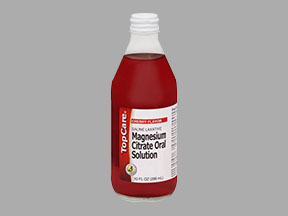
Magnesium Citrate Coupons & Savings Card – Discount Prices from $4.41
Generic for: Ra magnesium citrate, Cvs magnesium citrate, Sm magnesium citrate
This product is used to clean stool from the intestines before surgery or certain bowel procedures (such as colonoscopy, radiography), usually with other products. It may also be used for relief of constipation. However, milder products (such as stool softeners, bulk-forming laxatives) should be used whenever possible for constipation. Magnesium citrate is a saline laxative that is thought to work by increasing fluid in the small intestine. It usually results in a bowel movement within 30 minutes to 3 hours.
Our coupons are free to use. Before paying, show the pharmacist your Magnesium Citrate savings card to get your free discount. Use our filters below to edit the prescription box to match your needs. The Magnesium Citrate prices will update based on your prescription needs. Above our Magnesium Citrate coupons, you can change your location to see pharmacy prices and costs in other areas. We're here to help you buy Magnesium Citrate at the lowest price with our prescription discount card.
My prescription
Edit
296ML of 1.745GM/30ML, Magnesium Citrate (1 Bottle)
Select pharmacy

Walgreens
$4.41
COUPON PRICE
Albertsons
$16.81
COUPON PRICEMagnesium Citrate savings card
Show this card to your pharmacist
Walgreens
$4.41
BIN
ID
PCN
GRP
019876
LH35E1870C
CHIPPO
LHX
Powered by
This product is used to clean stool from the intestines before surgery or certain bowel procedures (such as colonoscopy, radiography), usually with other products. It may also be used for relief of constipation. However, milder products (such as stool softeners, bulk-forming laxatives) should be used whenever possible for constipation. Magnesium citrate is a saline laxative that is thought to work by increasing fluid in the small intestine. It usually results in a bowel movement within 30 minutes to 3 hours.
Our coupons are free to use. Before paying, show the pharmacist your Magnesium Citrate savings card to get your free discount. Use our filters below to edit the prescription box to match your needs. The Magnesium Citrate prices will update based on your prescription needs. Above our Magnesium Citrate coupons, you can change your location to see pharmacy prices and costs in other areas. We're here to help you buy Magnesium Citrate at the lowest price with our prescription discount card.
